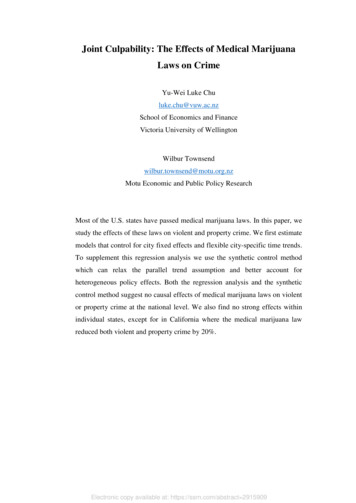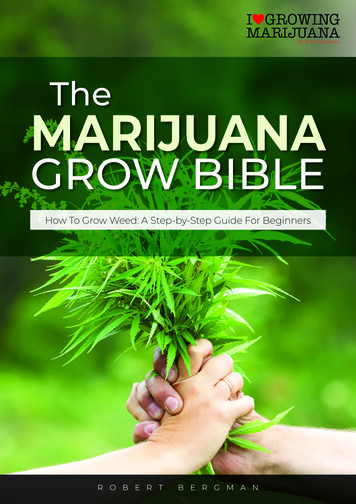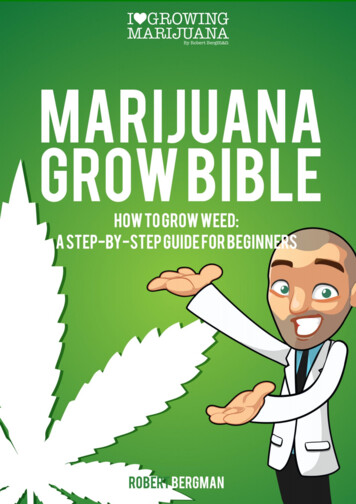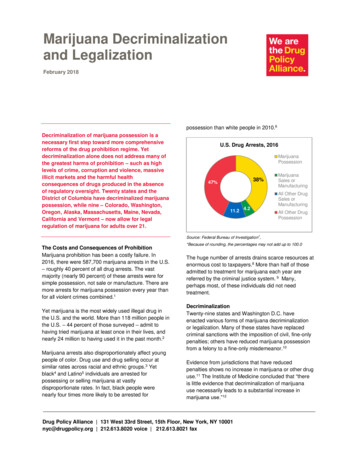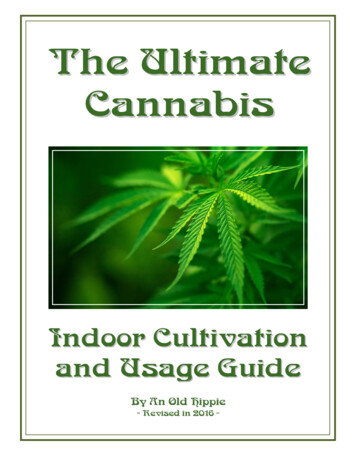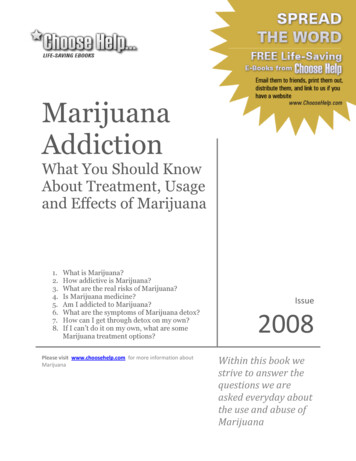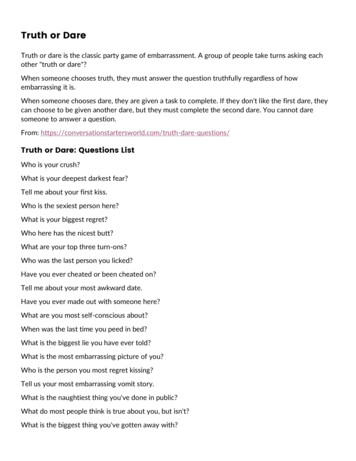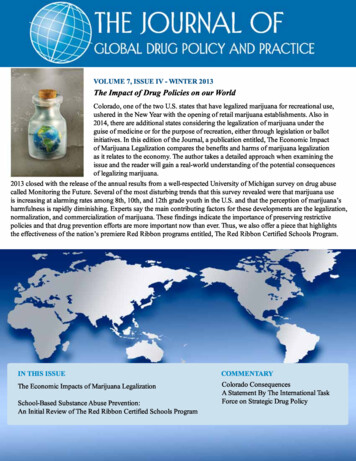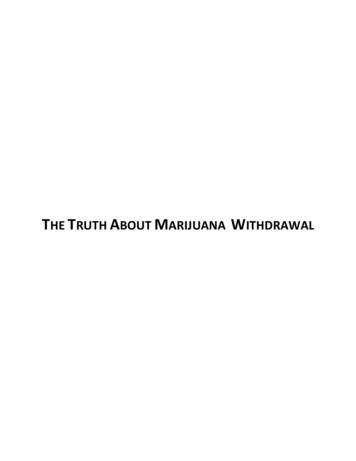
Transcription
THE TRUTH ABOUT MARIJUANA WITHDRAWAL
Table of ContentsThe Straight Dope on Marijuana Addiction and Withdrawals . 3Am I Really Addicted to Marijuana . 4Why Marijuana Addiction is Becoming More Common . 5The Physiology and Psychology of Weed Addiction and Withdrawals. 5The Physiology Of Weed Addiction . 6Psychology . 7The Truth About Marijuana Withdrawal . 8Marijuana Withdrawal Symptoms: . 8Anxiety . 8Irritability and Mood Swings . 9Low Tolerance to Stress . 9Insomnia and Fatigue . 10Vivid Dreaming and/or Nightmares. 10Depression . 11Lack of Appetite. 11Night Sweats . 12How Long Does Marijuana Withdrawal Last? . 12First Wave . 12Second Wave. 12Third Wave . 13Acute Withdrawal and Post Acute Withdrawal Syndrome (PAWS) . 13Factors that Influence Withdrawal Symptoms. 14Overcoming Marijuana Withdrawal Symptoms . 15
The Straight Dope on Marijuana Addiction and WithdrawalsYou know it, and I know it .addictive is total B.S.The popular notion that marijuana is notSure SOME people can smoke recreationally, just like some people canparty harder than Keith Richards for decades, then wake up one day andleave it all behind.But around 9% of regular smokers get hooked, and when you get hooked,it sneaks up on you It’s like a boa constrictor slowly wrapping around and squeezing you,except you don’t notice until you can’t breathe.I should know I was hooked for years The Bottom Line: Marijuana Addiction is Rare but VERY RealAnd it’s being whitewashed Because dealers, growers and lobbyists and greedy politicians are hoppingon the marijuana gravy train and cashing in.They don’t give a damn about people like you and me.It’s all about the Benjamins.And don’t even get me started on Stoner activists who deny the factsdespite mountains of scientific evidence that weed CAN and DOES causereal problems for real people every single day.They seem to think “If it doesn’t happen to me, it doesn’t happen”END RANTI wrote this little book to get the truth out about weed addiction andwithdrawal. It’s written from my personal experience and the experienceof the 1000’s of people who I’ve come in contact with over the last 8years.Let’s get down to business by look at what Marijuana addiction is reallylike and talk about withdrawal in detailThanks for ReadingJohn Mckee
Am I Really Addicted to MarijuanaYou’re either reading this because you think you might have a problemwith marijuana or you are worried about somebody you know.Be honest with yourself and it’s pretty easy to figure out:Do these sound familiar for you?:1) I’ve developed a tolerance to weed and need to smoke more weed,more often to get the same high that I used to.2) I experience withdrawal symptoms and smoke to avoid them. We’llcover a full list of withdrawal symptoms in the coming pages3) I smoke more weed than you plan to in quantity or frequency.4) I can’t cut down or quit, even though you want toSimple.RightTake a moment and reflect on your weed use.When you can’t quit because you avoid withdrawal or just can’t handlelife without it being stoned that’s a sign of a problem.Another clear sign is breaking promises about when you will smoke orwhen you will quit.When you break promises with yourself can really kill your confidenceand self-worth.So be honest with yourself and take a moment to reflect.Admitting you abuse marijuana it takes courage.Are you are smoking it when you shouldn’t be?while driving?During your workday, orI’m not saying weed impairs your ability to do these things, but theconsequences for getting a DUI or losing your job are huge.Logically, you just shouldn’t do it.Ask yourself this:Am I smoking weed to avoid problems in life?Weed can be an escape and way to feel nothing instead of feelingdepressed, anxious, or angry.I’ve been there and back. Believe me when I tell you that you can turnit around.With the right tools and a proven blueprint, quitting weed is even easierthan you think.
Why Marijuana Addiction is Becoming More CommonMarijuana addiction is becoming common because the weed is getting waystronger, easier to find, and finally being talked about.In the 90’s weed had about 7.5% potency for top-shelf buds.In 2013,only 20 years later that has jumped to 16%.More than double thestrength!!!High end weed today can be as high as 30% THC.Concentrates like budder, wax, snot, bho are very pure.are testing at greater than 80% THC.Many samplesThis aint your grandpa’s weed.Think of it this way, a ¼ gram of budder is the equivalent of smoking2.5 grams of top quality bud in the 90’s and pretty close to 5 grams inthe 70s and 80s.It’s becoming easier and easier to take in massive amounts of THC.hits harder and faster, creating a stronger high.ItA big dab of concentrate is like smoking multiple joints in seconds.Strong weed and concentrates are making weeds more available and easierto get hooked on.More People Than Ever Are Seeking HelpBetween 1992 and 2009, the number of marijuana users who receivedtreatment for dependence or abuse rose by more than 140%.It can be hard to admit you need help, and going to a treatment centerisn’t always feasible.QuitMarijuana.Org was built to help you quit weed. It is the only onlineresource built to help you quit weed safely and easily.The Physiology and Psychology of Weed Addiction and WithdrawalsIt’s science time.We are going to start off with how weed effect you physically andpsychologically.
The Physiology Of Weed AddictionMarijuana affects your brain by mimicking the neurochemicals in yourbody.These neurochemicals are described as endogenous cannabinoids, which youmay know as endocannabinoids.Neurochemicals known as anandamides aid the transmission of messagesbetween nerve cells. This is what enables the brain to process memories,emotions, thoughts, and information it receives through the senses.THC present in marijuana mimics anandamide, which is the endocannabinoidthat activates CB1 receptors. CB1 receptors respond to the psychoactiveeffects of marijuana.Weed and the AmygdalaThe amygdala is the hotbed of emotions in the brain. One of the manyfunctions of the amygdala is to awaken a sense of newness in us when weencounter a new situation or see a new object etc.When you smoke weed, it triggers cannabinoid stimulation. This is whyeven day to day things start to seem fresh and interesting.It also explains the popular association of marijuana with creativityand intellectual activity.The problem is that chronic weed use can cause down-regulation of thenatural receptors. Since the body gets the anandamide from smoking weed.It doesn’t need to produce it itself.Continued overstimulation can even dismantle the receptors and depletethem severely.Hacking Your Reward SystemMarijuana use also messes the ‘Reward System’ of the brain.Part of your brain known as the dopamine reinforcement pathway (DRP) orthe reward reinforcement pathway contains high levels of CB1 receptorsand endocannabinoids.The DRP is stimulated heavily by marijuana, significantly increasing theamount of dopamine in the brain after smoking.The DRP is stimulated by any rewarding activity.It’s key to oursurvival. It makes sure we eat and procreate by releasing dopamine sothat we experience pleasure.
Dopamine encourages us to repeat this activity again to achieve the samefeeling. This is why the urge to keeping smoking weed can be so hard toresist, despite the negative consequences.Finally, endocannabinoids also saturate the fat cells and remains inyour system for a long time. If you smoke marijuana regularly, it canstill remain in your brains for up to 4 months, even when you havestopped smoking.In my experience, I know a couple cases of people failing a drug testmore than 60 Days after they last smoked. Not many but a couple.PsychologyWhile weed is a relatively safe when used responsibly, it doesn’t meanthe marijuana is 100% safe for all users.Because marijuana was illegal for so long, we are just starting to learnabout its effects and be able to study them scientifically.I’ve been studying weed addiction and withdrawal for more than 10 years.If I’ve ectseveryoneSmoking weed can cause panic attacks in some people. For others, itprevents them from having panic attacks. Another set of people mayexperience panic attacks during withdrawal.Smoking weeds can alleviate mild depression. On the flip-side in largeror more frequent doses it can increase the feeling of depression.Everyone has different brain chemistry, so everyone will experience weeddifferently.This is important:The psychological craving of marijuana can be stronger than the physicalwithdrawal1.When your brain wants something badly, you need to learn the righttechniques to fight your urges and conquer your addiction.Is Marijuana Addictive? The age old question is still being debatedtoday. Dale Archer M.D. 2012. Retrieved e
The Truth About Marijuana WithdrawalThe simple concept that quitting weed can trigger withdrawal symptomsis relatively new There was basically no research or information on withdrawal 20 yearsago.When I quit smoking weed, I was one of the first people to write aboutmarijuana withdrawal online and to study the symptoms and solutions.I’ve gathered all my notes and the latest research on withdrawal on thesenext pages.Not everyone is going to experience every symptom. In fact, some peoplecan quit without any symptoms. I’m just laying them all out for you soyou can be prepared when you quit.With the legality of marijuana changing, I am certain you will see a lotof scientific studies that show the full range and severity of symptoms.What we do know is that marijuana withdrawal is forceful enough to makelong term abstinence difficult for regular users.One of the pillars of quitting effectively is to know your enemy.Marijuana Withdrawal Symptoms:AnxietyWithdrawing from marijuana can cause anxiety.Mild anxiety symptomsall the way to full blown panic attacks are possible.Some people, who get caught off guard, end up in the Emergency Roomfrom a panic attack.When I talk to people about anxiety and withdrawal, I’ve found that ifyou smoke to escape, or smoke to treat anxiety, the anxiety duringwithdrawal may be a little tougher.If you started smoking weed in your teens and smoked heavily, you havea higher chance of developing anxiety disorder in adulthood thanpeople who didn’t smoke.
The anxiety symptoms are worst in the first week and then graduallyfade relatively quickly at first, then gradually for one to threemonths.Irritability and Mood SwingsMood swings are common during marijuana withdrawal.Remember the Amygdala?It’s not very happy you have taken away its THC. Your brain is goingto need to adjust to not having its CB1 receptors tickled constantly.You may cry, feel depressed, or have a very short temper and you maycycle through all of these emotions quickly.This is good.This is the REAL you coming back.The irritability is most noticeable after the first week and graduallyfades towards the one month mark.If you’ve got family or roommates that you live with, give them a headsup, and they’ll typically go easy on you during the first 30 days.These effects usually subside 3 to 4 months after your quit date.Low Tolerance to StressWe all have a built in system to deal with stress AKA the ‘fight or flight’ response.It’s useful for emergency situations, but withdrawing from weed can putthe whole fight or flight response system out of whack.When you get stressed out very easily, it effects your ability to quit.The more stressed out you are, the worse your decision making skills andthe harder it is to say ‘no’ to yourself or others.Just like anxiety, there is a link between marijuana and low-stresstolerance. Low stress tolerance can cause marijuana use and relapse andmarijuana withdrawal causes low stress tolerance. 2The association between distress tolerance and cannabis use-relatedproblems: the mediating and moderating roles of coping motives and gender.Bujarski SJ, Norberg MM, Copeland J. 2012. Retrieved from:http://www.ncbi.nlm.nih.gov/pubmed/226988962
You are going to need to monitor and control your stress levels throughexercise, meditation, or other activities.Some of the best results I’ve seen come from mindfulness meditation.Insomnia and FatigueInsomnia is the most common symptom of marijuana withdrawal.This is where you can’t sleep to begin with or you can’t get uninterruptedsleep. The problem is that lack of sleep can affect your overall qualityof life by making your tired, fatigued, and restless.According to research3, as much as 50% of marijuana users experience somekind of sleep issues, most commonly insomnia.And while causality is still not certain (i.e. whether marijuana causesinsomnia or not), it definitely exacerbates the condition. Moreover,there is a definite link between how early you start using marijuana andinsomnia.For the most part, insomnia will only be a problem for less than a weekafter quitting, and you may be able to complete to normal in anywherefrom 2 weeks to a month. Once again, this depends on a host of factors,including frequency of use and the strength of the substance.Avoid having nicotine, alcohol, or caffeine before sleep. In fact cutback on these habits as well during marijuana withdrawal as they canseriously aggravate your sleep problems.In the QuitMarijuana.Org guide, I’ve got a strange secret that can teachto relax, let go, and fall asleep incredibly easily.Vivid Dreaming and/or NightmaresMost of the dreaming during sleep occurs at a stage known as ‘rapid eyemovement’ (REM). This is also where the brain is the most active. Butwhile marijuana is reported to reduce REM sleep, the opposite happenswhen you quit.Regular users of marijuana tend to experience an unusual increase in REMsleep upon quitting, which is popularly termed as ‘the REM reboundeffect’.Diagnostic Criteria for Cannabis Withdrawal Syndrome. David A. Gorelick,,Kenneth H. Levin, Marc L. Copersino, Stephen J. Heishman, Fang Liu, DouglasL. Boggs, and Deanna L. Kelly. 2012. Retrieved 11695/3
This in turn can lead to vivid dreaming. This withdrawal symptom usuallystarts 2 or 3 days after a person has taken marijuana and can extend upto 2 months. Nightmares can also be caused in extreme cases.But remember that REM sleep is not a bad thing as it renews your mind.If too much REM sleep is becoming a problem for you, then one can dealwith it in the same as he deals with other sleep issues as discussedabove.As for nightmares, depending on how severe they are and how significantlythey are affecting your life, there are several things you can do fortreatment. For instance, nightmares can be caused by sleep deprivationand REM sleep, and treating those conditions will reduce nightmares aswell.DepressionResearch does show that marijuana smokers are likely to get depressedmore than nonsmokers. This is especially true for heavy users.However, the causality factor is still under consideration. Sometimesdepression itself leads to marijuana use, and as a result, the depressionmay increase due to the dulling effects of the drug on the user’s feelingsand emotions.One study4 shows that depressive symptoms tend to be higher in individualswho use marijuana as compared to those who don’t.The very first thing you need to do in order to curb your depression isto avoid situations that can make you depressed. This can be tough forpeople who start smoking marijuana to deal with a traumatic experience.Improvement can also be experienced by taking better care of yourself,which includes increasing physical activity that includes both exerciseand a hobby you may like.Lack of AppetiteMore than 30% of people seeking treatment for marijuana addiction reporteating problems for the first few days, and sometimes up to 2-3 months.Top of the list of eating problems caused by marijuana withdrawal isloss of appetite, and sometimes this can cause unhealthy weight loss aswell.4The association between cannabis use and depression: a systematic review and meta-analysis of longitudinalstudies. Lev-Ran S, Roerecke M, Le Foll B, George TP, McKenzie K, Rehm J. 2014http://www.ncbi.nlm.nih.gov/pubmed/23795762
Digestion problems, such as cramps and nausea are also common. Lack ofappetite and other digestive problems tend to subside before the end ofa month.Night SweatsNight sweats are no joke. It’s brutal to wake up covered in sweat, butit happens pretty regularly and fades relatively quickly after the firstfew days.Sweating is a natural detoxification and is caused by the brainresponding to the change of balance due to lack of cannabinoids that hadbeen introduced through smoking weed.How Long Does Marijuana Withdrawal Last?I knowpersonaffectreliefweeks.I sound like a broken record, but Marijuana withdrawals vary fromto person. The same withdrawal symptom, such as anxiety, cantwo marijuana users in different ways so that one experiencesalmost immediately while other has to get treatment over severalSince THC is marijuana gets stored in the fat cells, marijuana stays inour system for long time even after we quit smoking it. Keeping thismind, a typical marijuana withdrawal timeline can be described asfollows:First WaveOnce you quit marijuana, withdrawal symptoms will start to take effectafter 24 hours to 72 hours. In this first wave of withdrawal, the mostcommon symptoms are: InsomniaLack of appetiteNight SweatsFor many individuals these symptoms peak and level off as soon as theyappear so that recovery is completed almost immediate. On average, thefirst withdrawals symptoms take about 2 weeks to wear off.Second WaveFrom day 3 to day 6, you will generally experience the followingsymptoms: AnxietyAnger and irritabilityRestlessness
They peak for 3-4 days and can take up to 3 weeks to wear off.Third WaveThe third stage starts from days 5-6 of quitting and can last for amonth. The major symptom at this stage is anger/irritability, andpossibly vivid dreaming and nightmares. However, this is the criticalstage. You need to stay strong enough and use effective remedies to fightyour withdrawal. Otherwise there are strong chances of relapse, wastingyour entire 3-4 weeks of abstinence.Another study5 displays withdrawal symptoms in the following order: Insomnia (Day 1)Nervousness (Day 4)Physical Symptoms(Day 5)Depression (Day 5)Loss of appetite (Day 5)Restlessness (Day 6)Vivid Dreams (Day 11)Anger/irritability (Day 14)So as you can see, there is a predictable framework between the onsetof insomnia and extreme mood swings.Acute Withdrawal and Post Acute Withdrawal Syndrome (PAWS)In clinical terms, withdrawal symptoms can be broadly classified intotwo categories:Acute WithdrawalThis stage of withdrawal is over in a short period of time. Once a personquits a drug after considerable using, the first few days naturally feeluncomfortable and distressing. This is where you experience the firstwave of symptoms as listed above.Note that while acute withdrawal for marijuana is less dangerous thanother substances (it can be life-threatening in the case of barbiturates,benzodiazepines, and even alcohol), the period of acute withdrawal islonger than most substances of abuse, i.e. up to two weeks or even amonth.5Time-course of the DSM-5 cannabis withdrawal symptoms in poly-substance abusers. Morten Hesse and BirgitteThylstrup. 2013. Retrieved from http://www.biomedcentral.com/1471-244X/13/258
Post-Acute Withdrawal Syndrome (PAWS)Depending on your history of marijuana use, you may not experience anyPAWS symptoms. For others, PAWS can last from 12 to 18 months. Once theacute phase is over, neurochemicals in your brain affected by marijuanaaddiction or abuse rebound to 80% of their previous levels. This allowsthe individual to think clearly and move forward in the healing process.But while most of the symptoms may have subsided, some effects ofpsychological withdrawal (as listed in the second and third wave above)will still remain.It is worthy of note that each symptom of post-acute withdrawal lastsfor a few days, after which they tend to wear off. Hence, it is allabout persisting in your efforts to quit marijuana and regain your mentalcomposure. Hence, you need to exercise patience and perseverance.Factors that Influence Withdrawal SymptomsRemember, Weed effects everyone differently.The length and severity of each withdrawal symptom is different foreveryone. Here are some of the factors that determine the severity ofwithdrawal.Age and Years of UseAge obviously plays a major role. For instance, if you have been usingmarijuana since your teens and now you are 45, then obviously withdrawalswill be a lot severe then if you quit a year after starting. Otherfactors include:Most Recent Level of UseIf you’ve been smoking 1/8 of bud a day, or ½ gram of oil a day, and youquit cold turkey, you are more likely to experience strong withdrawalsymptoms that someone who smokes a ½ joint a day.As you increase potency and dosage, the probability of withdrawalsymptoms increase.Addiction to Other DrugsBeing addicted to more than just weed can make quitting weed harder.This may sound contrary to some of the “experts”, but my belief is thatyou have to take it one step at a time.Quitting everything all at once may be biting off more than you can chew.
If you are drinking heavily, try to cut that out first.judgement and health far more that weed does.It affects yourAn Angry or Violent PersonalityIf you already have a violent or angry streak, the anger and irritabilitycaused by withdrawal can increase the risk of violent outbreaks6.It can also increase the probability that you will smoke if you use itto self-medicate from anger.Not Creating the Right Support NetworkThe people you choose to associate with, and who you tell about quittingcan have a big impact on you quitting.Communicating about what you are going through, and setting expectationswith the people who are close to you is something that is often overlookedwhen you first decide to quit weed.Wrong Approach to Quitting and RecoveryHere’s the bottom line:weed.It takes a well thought out plan to quit smokingYou need to know what to expect.That’s why I have written this little book. It’s important to understandwhat you may experience when you quit weed.Overcoming Marijuana Withdrawal SymptomsI’ve helped thousands of people quit smoking weed. I’ve also worked withmany people who have tried and failed.The number one cause of failure is not being prepared.When the severity of withdrawal symptoms hits, they can catch you offguard.At QuitMarijuana.Org, you’ll be able to plot out your own path to successby following a proven blueprint that takes you from start to finish.6Predicting violence among cocaine, cannabis, and alcohol treatment clients. S. Macdonalda, P. Ericksonb, S.Wellsb, A. Hathawayb, B. Pakulab. 2007 Retrieved ii/S0306460307001955
I’ll teach you how to reduce and eliminate withdrawal symptoms likeanxiety and insomnia so you can kick you weed addiction to the curb It’s time to start living the life you want to live.
The Bottom Line: Marijuana Addiction is Rare but VERY Real And it’s being whitewashed Because dealers, growers and lobbyists and greedy politicians are hopping on the marijuana
